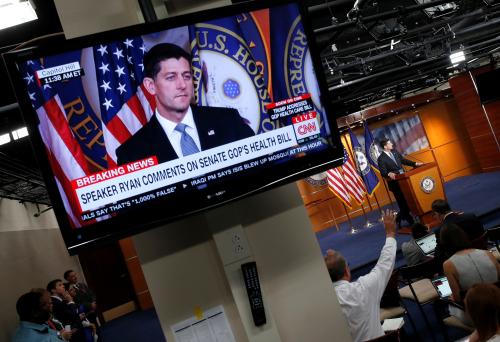This article originally appeared in Real Clear Markets on July 7, 2017.
Sometimes people do inhumane things. The Senate health care bill is a case in point. It denies health care to a large group of poor, disabled, and elderly Americans to give a big tax cut to a small group of very wealthy people.
But are Senate Republicans evil people? Do they lack a moral compass? I don’t think so. I think they are simply victims of a once-successful but now discredited economic ideology. That ideology says tax cuts for the rich will create jobs for the middle class. It says cutting benefits, including health benefits, for the poor will cause them to work harder and behave more responsibly. Granted there is a grain of truth in these propositions but they have now become a cartoon of their once-legitimate, Chicago-school ancestors.
Republicans have become trapped in their own rhetoric, crafted during years of being in opposition. As Ross Douthat noted in a recent New York Times column, drawing on new analysis in a report by Lee Drutman, that rhetoric is now well to the right of the beliefs held by the broader Republican electorate. Republican leaders have failed to recognize the fact that the economic views of those who voted Republican in 2016 “lean only slightly to the right.” Republicans could have used the Trump election to effect a political realignment—one that would have combined a more moderate set of economic policies than the Republican elite currently supports with a more moderate set of cultural positions than those espoused by leading Democrats.
Republicans have become trapped in their own rhetoric, crafted during years of being in opposition.
Instead, the Republican elites are now out-of-step with their followers and could pay a big political price if they continue down their current path. Where are the new ideas that might free them and us from our current impasse? Are there ideas that might even command some bipartisan support and help to move the country in a more pragmatic and centrist direction?
It’s not as if there aren’t plenty of good ideas to choose from. If the problem is a health care system that costs too much and delivers too little, the solution might be to allow the states to experiment with different ways of delivering care. My colleagues, Alice Rivlin and Stuart Butler, have both written about this option. As Rivlin notes:
“Republicans have historically had faith in state governments’ ability to manage public resources in the interests of their residents; Democrats stressed national standards and wanted Washington in charge. But this line is blurring. Obamacare contained provisions (notably the Section 1332 waiver process) that would allow states increasing latitude in spending their federal money. Governors have often proved more adept at brokering compromises across party lines than deeply polarized Washington.”
If the problem is a tax system that is way too complicated and anti-growth, the solution might be to partially replace the income tax with a value-added tax and/or a carbon tax. Several Republican candidates supported a value-added tax during the 2016 primaries and a number of leading Republicans, including James Baker, George Schultz, and Henry Paulson are now arguing for a carbon tax that would return all of the revenues raised to individuals in the form of a citizen’s dividend.
If the problem is a government that has grown too big, the solution might be to tackle the major drivers of that growth. Those drivers are benefits, especially health benefits, for our rapidly growing senior population, and interest on the debt. The Committee for A Responsible Federal Budget along with several distinguished budget commissions (Simpson-Bowles and Domenenci-Rivlin) have long argued for such an approach. But it would not include more tax cuts for the rich.
If the problem is too many Americans who are not working, the solution might be to condition government assistance on work or a willingness to retrain or relocate to where the jobs are. A Brookings-AEI working group on poverty wrestled with the issue and suggested something along these lines. Speaker Paul Ryan has also endorsed this approach at various points in the past.
A two-party system should lead to a competition of ideas. And with one-party now in control of both Congress and the White House, it should be possible to enact new legislation that is consistent with conservative philosophy but not the kind of mean-spirited and tortured bills now on offer. Even better would be reaching out to Democrats to find some common ground. On issues as important as health care and taxes, reforms enacted by only one party are unlikely to be sustainable.








Commentary
Op-edRepublicans are victims of a discredited economic ideology
July 7, 2017